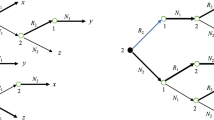Abstract
I will characterize the utilitarian and maximin rules of social choice game-theoretically. That is, I will introduce games whose solutions are the utilitarian and maximin distributions respectively. Then I will compare the rules by exploring similarities and differences between these games. This method of comparison has been carried out by others. But I characterize the two rules using games that involve bargaining within power structures. This new characterization better highlights the ethical differences between the rules.
Similar content being viewed by others
References
BarryBrian: 1976, ‘Power: an Economic Analysis’, in BrianBarry (ed.), Power and Political Theory, Wiley, New York.
Binmore, Kenneth: 1984, ‘Game Theory and the Social Contract’, Part I, London School of Economics discussion paper.
GauthierDavid: 1986, Morals by Agreement, Oxford University Press, Oxford.
HarsanyiJohn: 1953, ‘Cardinal Utility in Welfare Economics and in the Theory of Risk-Taking’, Journal of Political Economy 61, 434–35.
HarsanyiJohn: 1955, ‘Cardinal Welfare, Individual Ethics, and Interpersonal Comparisons of Utility’, Journal of Political Economy 63, 309–21.
HarsanyiJohn: 1977, Rational Behavior and Bargaining Equilibrium in Games and Social Situations, Cambridge University Press, Cambridge.
HarsanyiJohn: 1982, ‘Morality and the Theory of Rational Behavior’, in AmartyaSen and BernardWilliams (eds.), Utilitarianism and Beyond, Cambridge University Press, Cambridge.
KalaiE. and M.Smorodinsky: 1975, ‘Other Solutions to Nash's Bargaining Problem’, Econometrica 43, 513–18.
LuceR. Duncan, and HowardRaiffa: 1957, Games and Decisions, Wiley, New York.
NozickRobert: 1974, Anarchy, State, and Utopia, Basic Books, New York.
RapoportAnatol: 1970, N-Person Game Theory, University of Michigan Press, Ann Arbor.
RawlsJohn: 1971, A Theory of Justice, Harvard University Press, Cambridge, Massachusetts.
RobertsKevin: 1980, ‘Interpersonal Comparability and Social Choice Theory’, Review of Economic Studies 67, 421–39.
RubensteinAriel: 1982, ‘Perfect Equilibrium in a Bargaining Model’, Econometrica 50, 97–109.
ShapleyLloyd: 1969, ‘Utility Comparison and the Theory of Games’, in La Decision, CNRS, Paris.
ShubikMartin: 1982, Game Theory in the Social Sciences, MIT Press, Cambridge, Massachusetts.
VarianHal: 1984, Microeconomic Analysis, 2nd edition, Norton, New York.
WeirichPaul: 1984, ‘Interpersonal Utility in Principles of Social Choice’, Erkenntnis 21, 295–317.
YaariMenahem: 1981, ‘Rawls, Edgeworth, Shapley, Nash’, Journal of Economic Theory 24, 1–39.
Author information
Authors and Affiliations
Rights and permissions
About this article
Cite this article
Weirich, P. A game-theoretic comparison of the utilitarian and maximin rules of social choice. Erkenntnis 28, 117–133 (1988). https://doi.org/10.1007/BF00204428
Received:
Revised:
Published:
Issue Date:
DOI: https://doi.org/10.1007/BF00204428




